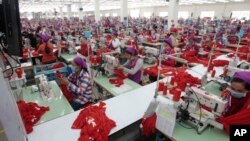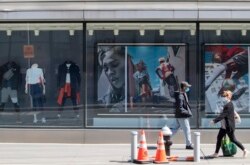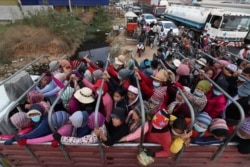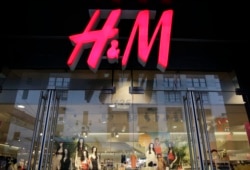When the COVID-19 pandemic interrupted global supply chains, major international brands canceled their garment orders, and with it put millions of workers in Asia out of work.
Popular brands saw their sales drop and have canceled orders from several countries, including from Cambodia and Bangladesh. Other brands have reduced their orders or renegotiated their terms.
This has far-reaching consequences in the countries where the clothes are produced. Suppliers cannot pay their workers, and with brands canceling orders, union workers VOA Khmer spoke to have called on buyers to stay with them during challenging times. They argue that workers have contributed to the brands’ wealth over the last three decades through their manual labor, and the crisis should not be carried by the workers alone. But labor protection is scarce, and many workers have been laid off without severance pay or outstanding pay, union activist Nazma Akter said.
“This kind of issue is really sad for us because they are not respecting the workers,” said Akter, founder of labor rights organization AWAJ Foundation, during a recent forum organized by Cornell University’s ILR School. “The brands, they are more [focused] on are the profit. The suppliers, they want to profit. No one is taking care of the loser.”
Bangladesh is the second-biggest garment exporter after China and has over 4,000 factories that employ more than 4 million workers. Its annual export of $35 billion accounts for 80 percent of its total export and contributes to 13 percent of the GDP.
The minimum wage for garment workers is about $95 a month. By the end of April, exports worth over $3.18 billion had been canceled or suspended, affecting 2.28 million workers, according to the Bangladesh Garment Manufacturers and Exporters Association.
Akter said some major US and EU brands had not taken enough responsibility for their orders and workers’ welfare. “This is the time to cooperate - not to cause the hurting of hundreds of workers’ lives and their community at risk,” she said.
But major brands told VOA Khmer they are committed to long-term business in the region even when facing a pandemic.
“We try to avoid the cancelation of orders,” said Stefan Porsche, Adidas media relations officer. “We are working in close collaboration with our partners to shift some of the orders to the second half of the year.”
The company said they had initiated a program to increase the health and safety requirements for suppliers since the beginning of the coronavirus outbreak in China. This includes providing additional protective masks, hand sanitizers, health checks, and more intensive cleaning measures.
“We are also promoting the exchange of information among our partners, particularly to leverage the experience gained in China to other countries,” Porsche said.
Since late April some factories in Bangladesh have resumed production.
But in Cambodia, the worst is yet to come. About 250 factories had suspended their operations and more than 130,000 garment workers had lost their jobs, according to a joint statement issued on June 2 by the Garment Manufacturers Association in Cambodia (GMAC), Cambodia Footwear Association, and the European Chamber of Commerce in Cambodia. Most others had reduced their activities, the press release said.
Ken Loo, secretary-general of GMAC, said the number would likely rise. “In total 300,000 workers could lose their jobs,” he said in an interview in early May.
An estimated 800,000 garment workers are employed in Cambodia, producing clothing amounting to roughly 80 percent of Cambodia’s exports.
Cambodia exported over $6.4 billion of garment products in the first ten months of 2019, according to the Ministry of Commerce.
Rong Chhun, president of the Cambodian Confederation of Unions, urged brands to stick to their promises. “We have to acknowledge that this is a global issue, not just in Cambodia,” he said. “But buyers should pay for what they have already ordered.”
Cambodia supplies garments and footwear products to major brands including Adidas, Nike, H&M.
Ia Elf, H&M Group spokeswoman, told VOA that her company was aware of the situation. “The rapid spread of the COVID-19 around the world has caused an exceptional situation and we know that the garment manufacturing suppliers, and their employees, are extremely vulnerable,” she said. “The crisis has a huge impact on millions of garment workers living in countries highly dependent on the textile industry.”
To alleviate the effects, H&M had recently joined a Call to Action to support garment workers, she said. This call includes a commitment to protecting garment workers’ income, health, and employment by paying for manufactured goods and goods in production.
“We are placing orders based on current forecasts and will continue to evaluate the situation on a daily basis,” Elf said. “And just as under normal circumstances, we will keep an open dialogue with suppliers about purchasing planning – an important part of being a responsible buyer, not just in times of crisis.”
In a similar vein, Nike said in a statement sent to VOA Khmer that the company would continue placing orders based on the market situation.
“We will continue to pay in full for finished products from all suppliers globally while honoring previously agreed payment terms for products in production,” the Nike press office statement said. “In the case of canceled orders, our policies and agreements with suppliers are, and have always been, that Nike will pay the appropriate amount of the order, depending on the stage of production as communicated by our supplier to enable the supplier to recover costs associated with the canceled order.”
Experts believe that neither suppliers nor big brands were prepared for the pandemic of this magnitude. Going forward, they should institute safety measures, Sarosh Kuruvilla, Professor of Industrial Relations at Cornell University’s ILR School said. “Proactively, for crises like this... what brands, the buyers, and the suppliers could have instituted is unemployment insurance through the payment of premium,” he said.
Some retailers in the US have struggled financially and laid-off workers, with some having filed for bankruptcy. JC Penney filed for partial bankruptcy mid-May. Kohl’s sales dropped by 43.5 percent in the first three months of 2020.
David Hayer, senior vice president of Global Sustainability at Gap Inc., said brands should take the opportunity to scout talent from other industries, such as the automobile industry, that had a better understanding of how to build strategic partnerships within their supply chains. Instead of only focusing on seasonal orders, he said, brands should build long-term partnerships from the production to the retailer levels.
“The opportunity is to go and get ... the right talent. A lot of these apparel supply chains have people that haven’t thought through how to build strategic relationships with vendors,” the Gap executive said.







